Law (179 found)
TRAINED TO TORTURE: Systematic war crimes by the Burma Army in Ta’ang areas of northern Shan State (March 2011 – March 2016)
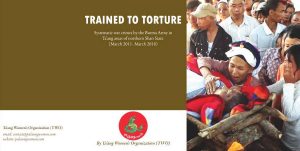 TWO documentation of human rights violations in Ta’ang areas of northern Shan State from March 2011 to March 2016 provides evidence that the Burma Army is committing war crimes, on a widespread, systematic basis – in particular torture, shelling of civilian targets, and forcing civilians to be porters and human shields […]
TWO documentation of human rights violations in Ta’ang areas of northern Shan State from March 2011 to March 2016 provides evidence that the Burma Army is committing war crimes, on a widespread, systematic basis – in particular torture, shelling of civilian targets, and forcing civilians to be porters and human shields […]
Briefing Paper: The legacy of mass torture and the challenge for reform in Myanmar
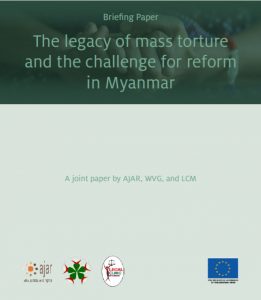 Torture has a long history in Myanmar and has been widely employed by the military regimes in power after 1962 […]
Torture has a long history in Myanmar and has been widely employed by the military regimes in power after 1962 […]
Animation: From Refugees to IDPs: Untold Story of Displacement Cycle in Burma
၁၉၉၄ ခုႏွစ္တြင္ ျမန္မာႏုိင္ငံဘက္ျခမ္းသို႔ အတင္းအဓမၼ ျပန္ပုိ႔ခံရေသာ မြန္ဒုကၡသည္မ်ား၏ ဒုကၡခံစားရပုံကုိ ဘားမားလင့္ ႏွင့္ ျမန္မာ႔အေရးပူးေပါင္းေဆာင္ရြက္သူမ်ားအဖြဲ႔တုိ႔မွ “ဒုကၡသည္မွသည္ ျပည္တြင္းတိမ္းေရွာင္ ဘ၀သုိ႔ – ျမန္မာႏုိင္ငံမွ ဥေပကၡာျပဳခံ ေနရပ္မွဖယ္ရွားခံရမႈ သံသရာ” ေခါင္းစဥ္ျဖင့္ ကာတြန္းသရုပ္ျပ တင္ဆက္ထားပါသည္ […]
• • •Report of the United Nations High Commissioner for Human Rights: Situation of human rights of Rohingya Muslims and other minorities in Myanmar
The present report, submitted pursuant to Human Rights Council resolution 29/21, examines the situation of human rights of Rohingya Muslims and other minorities in Myanmar […]
• • •“After release I had to restart my life from the beginning” The Experiences of Ex-political Prisoners in Burma and Challenges to Reintegration
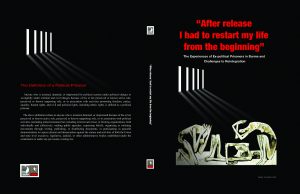 Since 1962, between 7,000 and 10,000 political prisoners have been imprisoned in Burma. Whilst a multitude of anecdotal records exist, there is very little comprehensive data concerning the torture and mistreatment experienced by political prisoners within Burma’s interrogation centers and jails […]
Since 1962, between 7,000 and 10,000 political prisoners have been imprisoned in Burma. Whilst a multitude of anecdotal records exist, there is very little comprehensive data concerning the torture and mistreatment experienced by political prisoners within Burma’s interrogation centers and jails […]
Multiple forces in the Divide, An Update on Karen 7th Brigade Region
Once one of the strongest regions in Burma for the Karen National Liberation Army (KNLA), the area around KNLA 6th Brigade now stands as one of the most divided […]
• • •SUPPORTING HUMAN RIGHTS IN MYANMAR: Why the U.S. Should Maintain Existing Sanctions Authority
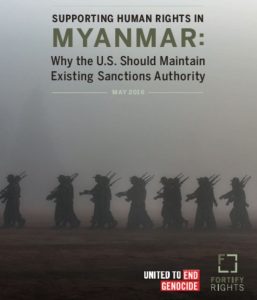 Is now the time for the U.S. Government to drop all sanctions on Myanmar (also known as Burma)? A network of corporate lobbyists and business associations are seeking to convince the administration of U.S. President Barack Obama to lift all remaining sanctions on the country by letting the existing sanctions authority expire this month […]
Is now the time for the U.S. Government to drop all sanctions on Myanmar (also known as Burma)? A network of corporate lobbyists and business associations are seeking to convince the administration of U.S. President Barack Obama to lift all remaining sanctions on the country by letting the existing sanctions authority expire this month […]
FBR Report: Burma Army Launches Attacks Across Kachin State
The Burma Army is currently launching small scale attacks across different areas of Kachin and Shan states. They have killed and wounded several villagers, including wounding a 7-year-old girl and killing a 60 year-old woman, and displaced thousands in an attempt to gain total control over the region […]
• • •Burma: Country Reports on Human Rights Practices for 2015
Burma has a quasi-parliamentary system of government in which national parliament selects the president and constitutional provisions grant one-quarter of national, regional, and state parliamentary seats to active-duty military appointees […]
• • •Save The Namtu River
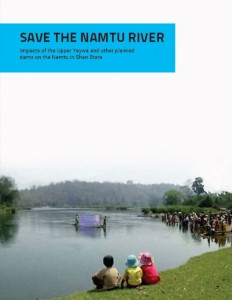 In January 2016, Burma’s state media reported that Naypyidaw was proceeding with four new hydropower dams on the Namtu (Myitnge or Dokhtawaddy) River, three of which are in conflict areas of Shan State […]
In January 2016, Burma’s state media reported that Naypyidaw was proceeding with four new hydropower dams on the Namtu (Myitnge or Dokhtawaddy) River, three of which are in conflict areas of Shan State […]

 All posts
All posts